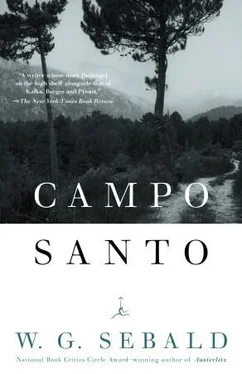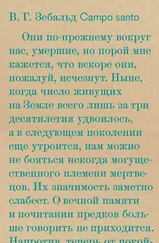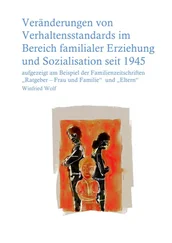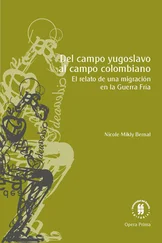We are so moved by photographic images because of the curious aura of another world that sometimes emanates from them. Kafka, as many of his diary notes show, could fix such pictures in the mental snapshots he took with his sympathetic but ice-cold eye. Of Frau Tschissik the Jewish actress, he makes a particular note about “her hair set in 2 waves and illuminated by the gaslight,” and a little later, in his description of the same woman, he comes to her cosmetics. “I usually hate the use of powder,” he writes, “but if this whiteness, like a veil clinging close to the skin and of a slightly cloudy, milky color is the effect of powder, then all women should powder themselves.” In passages like these and many others, where the observer (who stands a great distance away yet is consumed by longing) is absorbed in the individual, isolated aspects of a physicality beyond his reach, for instance the “faint white of the low neck of a blouse,” we may conjecture that the erotic aura of such pictures — snapshots taken, so to speak, without permission — is due to their proximity to death. For the very reason that looking at one’s fellow men with so pitiless a gaze is forbidden, one has to look again and again. The all-revealing, all-penetrating gaze is subject to compulsive repetition, always wanting to reassure itself that it really did see what it saw. Nothing is left but looking, an obsession in which real time is suspended while, as we sometimes feel in dreams, the dead, the living, and the still unborn come together on the same plane. When Kafka visits the Kaiser Panorama in Friedland on a business trip in the winter of 1911, and looks through the eyepiece into the depths of artificial space, he sees the city of Verona populated by people “like wax figures, their soles fixed to the ground on the sidewalk.” Two years later, he will be walking in those very streets and feeling as remote from everything living as the wax figures he saw in Friedland. The innermost mystery of secular metaphysics is this strange sensation of physical absence, something evoked by what might be called an overdeveloped gaze. Significantly enough, the customers coming out of the twilight of the nickelodeon, and going back into the street, always have to give themselves a little shake before they are fully in control of the bodies they had shed as they were absorbed in looking at the panorama.
Kafka’s comments on photography suggest that he felt there was something fundamentally uncanny about this way of copying life. Friedrich Thieberger, for instance, remembers once meeting Kafka in the street when he himself had an unwieldy box for making photographic enlargements under his arm. Thieberger writes that Kafka asked, in surprise, “Taking photographs?” and added, “That’s really rather sinister.” Then, after a short pause, he continued, “And you enlarge them as well!” Kafka’s books too contain many indications of the vague horror he felt at the impending mutations of mankind as the age of technical reproduction opened, mutations in which he probably saw the imminent end of the autonomous individuality formed by the bourgeois culture. The freedom of movement of the heroes of his novels and stories, which is not great to begin with, steadily undergoes further restriction in the course of the action, while figures already called to life by an inscrutable series of laws take over, characters such as the court functionaries, the two idiotic assistants and the three lodgers in The Metamorphosis , executives and officials whose purely functional, amoral nature is obviously better suited to this new state of affairs. In the Romantic period the doppelgänger, which first aroused a fear of mechanical appliances, was still a haunting and exceptional phenomenon; now it is everywhere. The whole technique of photographic copying ultimately depends on the principle of making a perfect duplicate of the original, of potentially infinite copying. You had only to pick up a stereoscopic card and you could see everything twice. And because the copy lasted long after what it had copied was gone, there was an uneasy suspicion that the original, whether it was human or a natural scene, was less authentic than the copy, that the copy was eroding the original, in the same way as a man meeting his doppelgänger is said to feel his real self destroyed.
For such reasons I have always wanted to know whether Kafka ever saw the film The Student of Prague , large parts of which were shot in his native city in 1913; it must certainly have been screened there too. It is true that there is no reference to it anywhere in Kafka’s letters and diaries, and Zischler tells us nothing about it either, but we may assume that the people of Prague did not ignore this famous product of the new cinematic art, with its brightly lit exterior shots. Supposing that Kafka really did see the film at this time, it would have been almost inevitable for him to recognize his own story in that of the student Balduin who is pursued by his own likeness, just as in the same year his reflections on a still from the film with Albert Bassermann, Der Andere (“The Other”), on which Zischler does write at some length, led to Kafka’s producing what Zischler calls “a snapshot of himself.” The still, which Kafka describes to Felice, reminds him of a production of Hamlet that he saw in Berlin, and of a part of his life that is now behind him, a kind of legacy in which, as so often happens when one is looking at old photographs, he is horrified to become aware of the progressive derealization of his own person and the approach of death. “Ghostly” is perhaps the best word to describe Bassermann’s appearance here. Indeed, early movies are ghostly in general, and not just because their favorite subjects included split personalities, doppelgängers and revenants, extrasensory perception, and other parapsychological phenomena, but also because of the way that for technical reasons the actors moved in and out of what was still the completely motionless scene around them like ghosts walking through a wall. Most ghostly of all, of course, is the quasi-transcendental gaze, cultivated by the male stage actors of the time, which found its ultimate expression in film, a gaze that seems to be bent on a life in which the tragic hero no longer has any part. Kafka, who often felt like a ghost among his fellow men, knew of the insatiable greed felt by the dead for those who are still alive. All his writing can be understood as a form of noctambulism, or the stage preceding it. “Walked in the streets for two hours weightless, boneless, bodiless, and thought of what I have been through while writing this afternoon,” he notes once. He imagines sending nocturnal letters to Berlin, and he himself is the phantom who, he tells Milena, drinks the kisses that he has sent out of the air before they can arrive. Zischler also quotes the passage from a letter where Kafka tells us how, going home in the electric tram, he read fragments of the posters he passed, concentrating hard. Zischler comments that Kafka’s curiosity made him soak up such images. They were obviously his substitute for a life that he could not have, insubstantial nourishment from which he was constantly developing fantastic scenarios in his dreams, both sleeping and waking, repeatedly becoming a bizarre figure from the movies himself in those scenarios. There was a strange episode when, so he tells Max Brod on a postcard, he felt faint at the doctor’s, had to lie down on the couch, and suddenly “felt so very much a girl that I attempted to put my girl’s skirt in order with my fingers.” Are not such dream sequences like films screened in the camera obscura of his mind, through which he moves like his own ghost? Zischler delicately probes the currents running between reality and imagination. The films about which he writes are really just the filter through which a new light is cast on the intensity of an almost uninterrupted process of dreaming and mourning, shifting between real life and fiction. Kafka’s diaries are full of accounts of experiences in which daily life dissolves into airy pictures before our eyes, as if in a cinematic effect. For instance, he stands on a railway station platform, saying good-bye to the actress Frau Klug:
Читать дальше












